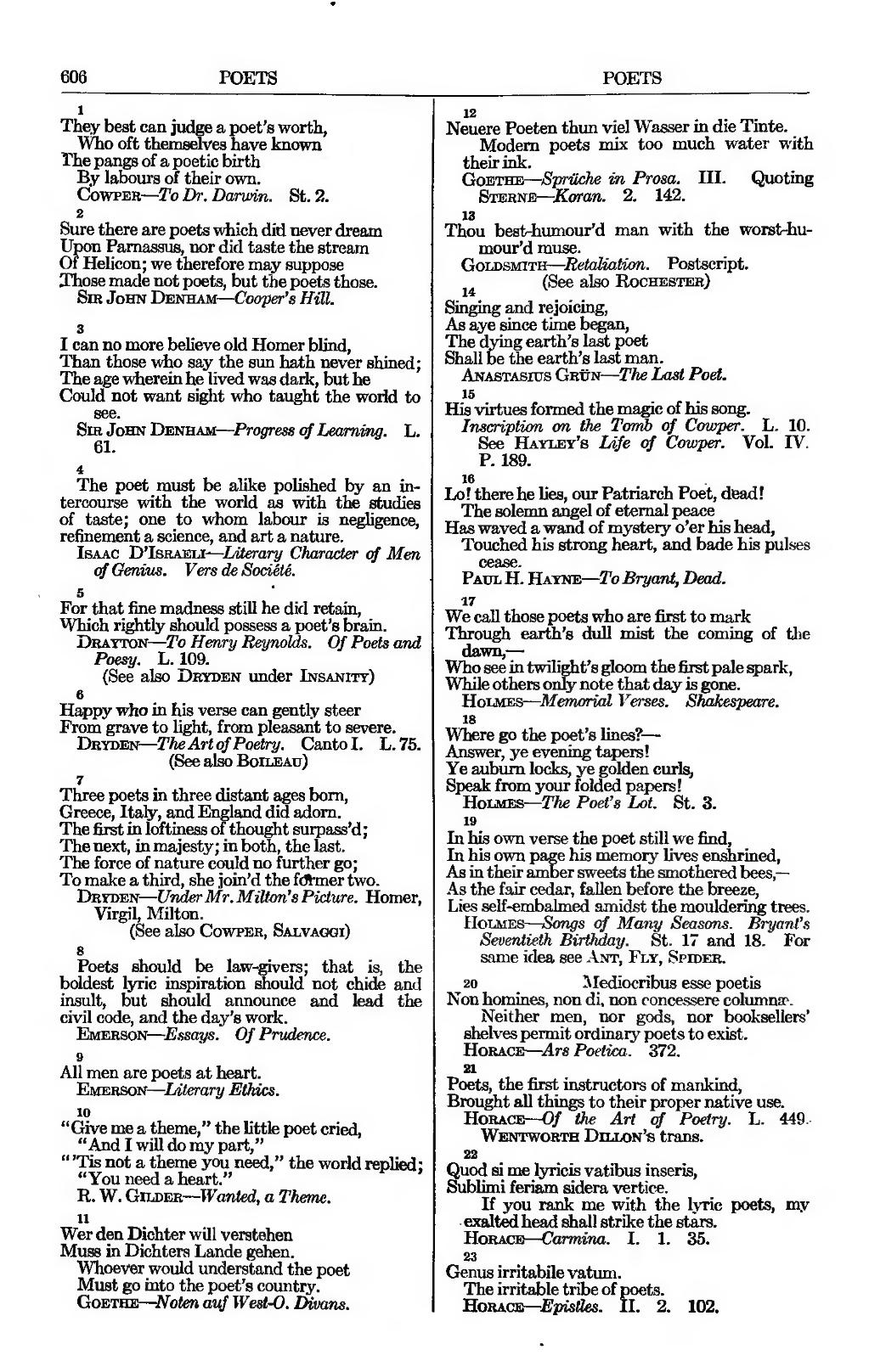They best can judge a poet's worth,
Who oft themselves have known
The pangs of a poetic birth
By labours of their own.
Sure there are poets which did never dream
Upon Parnassus, nor did taste the stream
Of Helicon; we therefore may suppose
Those made not poets, but the poets those.
I can no more believe old Homer blind,
Than those who say the sun hath never shined;
The age wherein he lived was dark, but he
Could not want sight who taught the world to see.
The poet must be alike polished by an intercourse with the world as with the studies
of taste; one to whom labour is negligence,
refinement a science, and art a nature.
Isaac D'Israeli—Z/iferan/ Character of Men
of Genius. Vers de Societe.
For that fine madness still he did retain,
Which rightly should possess a poet's brain.
Drayton—To Henry Reynolds. Of Poets and
Poesy. L. 109.
| seealso = (See also Dryden under Insanity)
| topic = Poets
| page = 606
}}
{{Hoyt quote
| num = 6
| text = <poem>Happy who in his verse can gently steer
From grave to light, from pleasant to severe.
Dryden—The Art of Poetry. Canto I. L. 75.
| seealso = (See also Boileau)
| topic = Poets
| page = 606
}}
{{Hoyt quote
| num = 7
| text = <poem>Three poets in three distant ages born,
Greece, Italy, and England did adorn.
The first in loftiness of thought surpass'd;
The next, in majesty; in both, the last.
The force of nature could no further go;
To make a third, she join'd the foVmer two.
Dryden—Under Mr. Milton's Picture. Homer,
Virgil, Milton.
| author =
| work =
| place =
| note =
| seealso = (See also Cowper, Salvaqgi
| topic = Poets
| page = 606
}}
{{Hoyt quote
| num = 8
| text = <poem>Poets should be law-givers; that is, the
boldest lyric inspiration should not chide and
insult, but should announce and lead the
civil code, and the day's work.
Emerson—Essays. Of Prudence.
All men are poets at heart.
Emerson—Literary Ethics.
"Give me a theme," the little poet cried,
"And I will do my part,"
"'Tis not a theme you need," the world replied;
"You need a heart."
R. W. Gilder—Wanted, a Theme.
Wer den Dichter will verstehen
Muss in Dichters Lande gehen.
Whoever would understand the poet
Must go into the poet's country.
Goethe—Noten auf West-O. Divans.
Neuere Poeten thun viel Wasser in die Tinte.
Modern poets mix too much water with their ink. Goethe—Spriiche in Prosa. III. Quoting Sterne—Koran. 2. 142.
Thou best-humour'd man with the worst-humour'd muse.
Singing and rejoicing,
As aye since time began,
The dying earth's last poet
Shall be the earth's last man.
Anastasius GrUn—The Last Poet.
His virtues formed the magic of his song.
Inscription on the Tomb of Cowper. L. 10.
See Hayley's Life of Cowper. Vol. IV.
P. 189.
Lo! there he lies, our Patriarch Poet, dead!
The solemn angel of eternal peace
Has waved a wand of mystery o'er his head,
Touched his strong heart, and bade his pulses
cease.
Paul H. Hayne—To Bryant, Dead.
We call those poets who are first to mark
Through earth's dull mist the coming of the
dawn,—
Who see in twilight's gloom the first pale spark,
While others only note that day is gone.
Holmes—Memorial Verses. Shakespeare.
Where go the poet's lines?—
Answer, ye evening tapers!
Ye auburn locks, ye golden curls,
Speak from your folded papers!
Holmes—The Poet's Lot. St. 3.
In his own verse the poet still we find,
In his own page his memory fives enshrined,
As in their amber sweets the smothered bees,—
As the fair cedar, fallen before the breeze,
Lies self-embalmed amidst the mouldering trees.
Holmes—Songs of Many Seasons. Bryant's
Seventieth Birthday. St. 17 and 18. For
same idea see Ant, Fly, Spider.
Mediocribus esse poetis
Non homines, non di, non concessere columnae.
Neither men, nor gods, nor booksellers'
shelves permit ordinary poets to exist.
Horace—airs Poelica. 372.
Poets, the first instructors of mankind,
Brought all things to their proper native use.
Horace—Of the Art of Poetry. L. 449,
Wentworth Dillon's trans.
Quod si me lyricis vatibus inseris,
Sublimi feriam sidera vertice.
If you rank me with the lyric poets, my
exalted head shall strike the stars.
Horace—Carmina. I. 1. 35.
Genus irritabile vatum.
The irritable tribe of poets.
Horace—Epistles. II. 2. 102.

